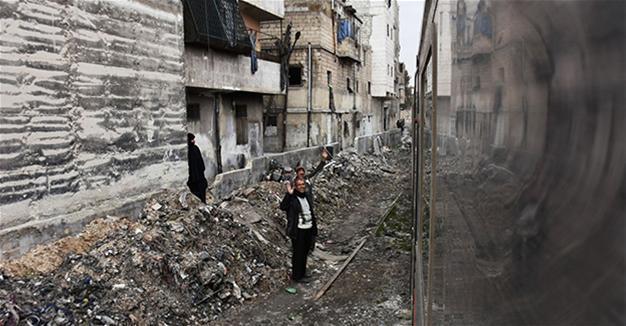Still early for constitutional draft in Syria: Turkish official
Sevil Erkuş - ANKARA

AFP photo
Turkey is not aware of a constitutional draft handed over to Syrian officials from a Russian delegation in Astana, a Foreign Ministry official has said, noting that the stages of the political transitional process have been outlined by U.N. Security Council.“No draft constitution was presented to us. I don’t know if any was submitted to the opposition,” a senior foreign ministry official familiar with the Astana talks told Hürriyet Daily News.
Guarantor countries decided to restrict the framework of Astana talks merely to just the cease-fire, the official said, noting that they would be able to pave the way for a political process later. The U.N. resolution suggests first establishing a transitional body and then drafting a constitution.
Russia presented a proposal on a new constitution for conflict-torn Syria during a meeting with the chief representative of the rebel factions, Mohammed Alloush, in the Kazakh capital Astana. Russian Foreign Minister Sergei Lavrov said on Jan. 25 that the blueprint written by Russian experts was based on opinions from the Syrian government, opposition and regional powers.
Alexander Lavrentiev, who led his country’s delegation at the talks, on Jan. 24 said that Russia had presented the rebels with the draft text of the constitution “to help speed up this process and give it some more impetus.”
“In no way do we want to interfere in the drafting and adopting of the basic law of the constitution of the country. We believe that the Syrian people must lead this process,” Lavrentiev said.
Syria’s opposition reportedly rejected the proposal warning Kremlin against repeating the mistake made by the George W. Bush administration when U.S. overthrew Iraq’s dictator Saddam Hussein.
Turkish, Russian and Iranian officials to convene
Turkish, Russian and Iranian delegations will come together in the coming days to discuss a cease-fire monitoring system and will also discuss enforcement measures for the truce.
Turkey considers the inclusion of Iran in the cease-fire as “success” because the violations in a truce deal brokered by Turkey and Russia were made by the Syrian regime and Hezbollah militias over the justification that some Syrian opposition groups in Barada Valley and East Ghouta were affiliated to al-Nusra, which is excluded from the deal.
The official said the Astana meeting aimed to bring the armed groups and the regime together, although views of the parties on the cease-fire, such as complaints made by the opposition regarding cease-fire violations in Barada Valley and East Ghouta, were discussed indirectly.
Turkey has made special efforts for the participation of U.N. Special Envoy for Syria Staffan de Mistura at the talks, the official said, adding that the contribution of the U.S. is also crucial to achieve success to resolve the Syrian crisis.
Ankara attributes value to participation of armed groups at the upcoming talks in Geneva, so that the cease-fire could be reinforced and outcomes of the peace talks could be implemented on the ground. But the earlier structure of the Syrian rebel delegation should also be preserved in Geneva, the official stressed.
















